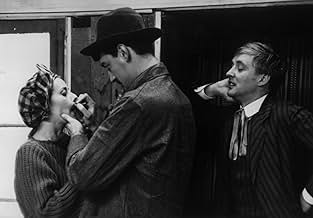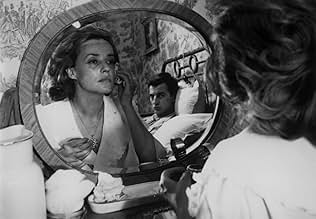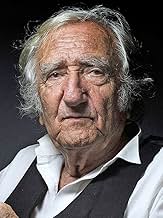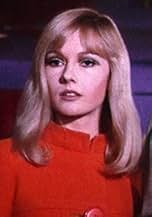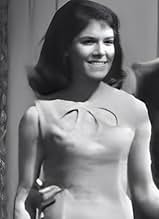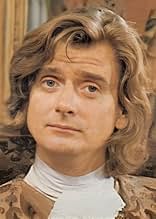AVALIAÇÃO DA IMDb
7,7/10
46 mil
SUA AVALIAÇÃO
Décadas de um triângulo amoroso entre dois amigos e uma mulher impulsiva.Décadas de um triângulo amoroso entre dois amigos e uma mulher impulsiva.Décadas de um triângulo amoroso entre dois amigos e uma mulher impulsiva.
- Direção
- Roteiristas
- Artistas
- Indicado para 2 prêmios BAFTA
- 3 vitórias e 4 indicações no total
Oskar Werner
- Jules
- (as Oscar Werner)
Serge Rezvani
- Albert
- (as Bassiak)
Michel Subor
- Récitant
- (narração)
- …
Danielle Bassiak
- Compagnon d'Albert
- (não creditado)
Elen Bober
- Mathilde
- (não creditado)
Pierre Fabre
- Ivrogne in Cafe'
- (não creditado)
Dominique Lacarrière
- Une des femmes
- (não creditado)
Bernard Largemains
- Merlin
- (não creditado)
Kate Noelle
- Birgitta
- (não creditado)
Jean-Louis Richard
- Cliente au Cafe'
- (não creditado)
Michel Varesano
- Cliente au Cafe'
- (não creditado)
Christiane Wagner
- Helga
- (não creditado)
- Direção
- Roteiristas
- Elenco e equipe completos
- Produção, bilheteria e muito mais no IMDbPro
Avaliações em destaque
Those with heavy sensibilities along the lines of conventional "morality" seem to have a hard time allowing themselves to enjoy this film for what it is: A beautiful visual poem about the passing of time and the progression and growth of an unusual friendship. This friendship may be unusual but feels completely natural and true. Jules and Jim if anything, exhibit great maturity in their relationship with each other and Catherine. It's refreshing to see a film dealing with a deep love, friendship and emotional bond between two males and a mutual love for a woman, without the usual competitiveness and controlling possessiveness that is the norm. Jules and Jim come off more as an enlightened pair. It seems understood among them there is no real belonging of one human being to another. Catherine's whims of the heart are discussed between them at every stage throughout the film and they are willing to accept them and love her for who she is as well as each other.
I do feel that this film lost it's pacing toward the end and seemed to speed up to conclusion. That being it's only flaw. Visually it is stunning. Francois Truffaut was a poet with the camera and his subtle nuances are captivating. The scenes of Jules, Jim and Catherine enjoying days together seem so natural and evoke the feel of wonderful days spent together among best friends that transported me back to days gone by.
"we met with a kiss/ a hit, then a miss/ and we parted/ we went our own ways/ in life's whirlpool of days/ around and around we go/ together bound/ together bound."
I do feel that this film lost it's pacing toward the end and seemed to speed up to conclusion. That being it's only flaw. Visually it is stunning. Francois Truffaut was a poet with the camera and his subtle nuances are captivating. The scenes of Jules, Jim and Catherine enjoying days together seem so natural and evoke the feel of wonderful days spent together among best friends that transported me back to days gone by.
"we met with a kiss/ a hit, then a miss/ and we parted/ we went our own ways/ in life's whirlpool of days/ around and around we go/ together bound/ together bound."
Two lads from different backgrounds form a bond, a French boy with dark hair, an Austrian blond, quite Bohemian in their ways, taking pleasure all their days, and then Catherine makes it three, and waves her wand. Jim is smitten with this beauty and he falls, but then war breaks out, and homeland duty calls, so they marry, relocate, intense fighting means a break, she has a child, world reconciles, and bonds remake. Jules travels to the home of his two friends, where the triangle rotates, gyrates and bends, now he's coupled with Catherine, but Jim feels no chagrin, though it's clear this isn't where the story ends.
Jeanne Moreau is always outstanding!
Jeanne Moreau is always outstanding!
Time and revisionist critics have tried to tarnish the gleam of Truffaut's final masterpiece - citing its apparent misogyny and apoliticism; but for some of us, 'Jules et Jim' is the unforgettable film that opened the gates to both European film, and the great masters of American cinema like Hitchcock, Hawks and Ray.
'Jules et Jim' is, along with 'Citizen Kane', THE vindication of the pleasures of cinematic form: the first half especially, in its rush of narrative registers and technical exuberance, is unparalleled in modern film. This isn't mere trickery - the use of paintings, books, plays, dreams, conversations, documentary footage, etc., as well as the different ways of telling a story through film, all point to the movie's theme - how do you represent people and the world in art without destroying them? Or is art the only to save people and life from extinction?
The foregrounding of theatricality, acting, disguises, pseudonyms, games, works-within-the-work, all point to the high modernism in which the film is set, when the old certainties about identity and place were being destroyed by the Great War. In fact the film could be considered Cubist in the way it uses film form to splice up and rearrange images, space, characters, viewpoints.
Truffaut's film is a beautiful elegy about time: the historical time heading towards destruction in the shape of the Nazis, and the circular time of love, obsession and art. These times struggle in the film's structure, history zipping past years in the framing, Parisian sections, and days stretching out interminably in the central rural rondelay.
Far from being misogynistic, the film places Catherine's speech about 'grains of sand' at its philosophical heart. AND she's played by Jeanne Moreau, the most honest and human of all great actresses.
'Jules et Jim' is, along with 'Citizen Kane', THE vindication of the pleasures of cinematic form: the first half especially, in its rush of narrative registers and technical exuberance, is unparalleled in modern film. This isn't mere trickery - the use of paintings, books, plays, dreams, conversations, documentary footage, etc., as well as the different ways of telling a story through film, all point to the movie's theme - how do you represent people and the world in art without destroying them? Or is art the only to save people and life from extinction?
The foregrounding of theatricality, acting, disguises, pseudonyms, games, works-within-the-work, all point to the high modernism in which the film is set, when the old certainties about identity and place were being destroyed by the Great War. In fact the film could be considered Cubist in the way it uses film form to splice up and rearrange images, space, characters, viewpoints.
Truffaut's film is a beautiful elegy about time: the historical time heading towards destruction in the shape of the Nazis, and the circular time of love, obsession and art. These times struggle in the film's structure, history zipping past years in the framing, Parisian sections, and days stretching out interminably in the central rural rondelay.
Far from being misogynistic, the film places Catherine's speech about 'grains of sand' at its philosophical heart. AND she's played by Jeanne Moreau, the most honest and human of all great actresses.
Jules et Jim is a difficult film, there's no question about that. I'd say the only thing that kept me watching was my love of Truffaut his ingenuity in cinematography, dialogue and just the whole tone of the film. That he could keep such melodramatic (if not drab) stuff somewhat entertaining is a testament to his mastery of the medium. I loved the blending of historical film into the narrative; I don't know if he was the first person to do this I highly doubt it but he certainly did it well in this picture.
Jules et Jim is a study of capriciousness. Catherine a woman to whom monogamy seems like a foreign concept is, to paraphrase the film, `not particularly intelligent, beautiful or kind, but she's treated like a queen.' Why Jules and Jim love her so, I don't know. They seem like strong enough characters to be without such a difficult woman, but I guess that question is at the center of the film.
For some reason, Jules et Jim reminded me of L'Avventura by Antonioni maybe because it was also a hard movie to enter and because the characters were so inaccessible. There are certainly elements of the neo-realism in this film, (one need look no further than the extensive use of mist and the forest scenes that closely resemble the dream sequences of Fellini, De Sica, et. al.)
Overall, I would say this picture is worthwhile, although there are certainly better, more accessible and mature Truffaut films out there.
Jules et Jim is a study of capriciousness. Catherine a woman to whom monogamy seems like a foreign concept is, to paraphrase the film, `not particularly intelligent, beautiful or kind, but she's treated like a queen.' Why Jules and Jim love her so, I don't know. They seem like strong enough characters to be without such a difficult woman, but I guess that question is at the center of the film.
For some reason, Jules et Jim reminded me of L'Avventura by Antonioni maybe because it was also a hard movie to enter and because the characters were so inaccessible. There are certainly elements of the neo-realism in this film, (one need look no further than the extensive use of mist and the forest scenes that closely resemble the dream sequences of Fellini, De Sica, et. al.)
Overall, I would say this picture is worthwhile, although there are certainly better, more accessible and mature Truffaut films out there.
Tonight I finally watched Jules and Jim again for the first time in many years, and it made me angry. I'm not sure why, but there's something about the romanticization of inconstancy that I find disturbing. Jeanne Moreau is, of course, riveting, mostly, and the film is beautifully made. It's just that I can't shake the feeling that what is being portrayed as a great force of nature the essence of Moreau's character as "une vrai femme" -- is really a powerful but unsteady egotism, enormous grace and charm coupled with an inability to conceive of the reality of other people, or at least to share in mutual reality. In its place there is the lightning of desire in an oversimplified context of defiance against hypocrisy. There is something false about the whole business, as if the movie wants to celebrate the (ostensible) freedom of la belle Catherine and to do so it must attribute the human damage she causes to some grand sort of fate, not ordinary consequence, and the failure and the damage is made to seem mysteriously inevitable. Worse yet, by identifying her as an elemental power and attributing this to her absolute femininity, the film is misogynistic. That is, it implies that the ultimate nature of woman is beyond reason, beyond morality.
And yet Truffaut does it all so beautifully that it seems to undercut the negative part, the pain and waste of what happens to people. Still, smiling cruelty is cruelty. Sorry for ranting. I wanted to like the movie, and I did to a large extent, but it bothered me, too.
And yet Truffaut does it all so beautifully that it seems to undercut the negative part, the pain and waste of what happens to people. Still, smiling cruelty is cruelty. Sorry for ranting. I wanted to like the movie, and I did to a large extent, but it bothered me, too.
Você sabia?
- CuriosidadesHenri-Pierre Roché's original novel was based on his own experiences as a young man. The original Catherine was still alive when the film was released and even attended the premiere incognito.
- Erros de gravaçãoWhen Catherine lights the letters on fire, they are at first away from her dress, but in the next shot they are burning on top of her dress.
- Versões alternativasThe Criterion Region 1 disc and the Tartan Region 2 DVD have a scene in which the film is reversed left/right. When Jules, Jim, and Albert are sitting on the grass sharing stories about the war, the order of the three characters repeatedly changes between shots. This does not occur in other DVD releases of this film, including the Fox/Lorber Region 1 release.
- ConexõesEdited into Laggiù qualcuno mi ama (2023)
Principais escolhas
Faça login para avaliar e ver a lista de recomendações personalizadas
- How long is Jules and Jim?Fornecido pela Alexa
Detalhes
- Data de lançamento
- País de origem
- Idiomas
- Também conhecido como
- Jules and Jim
- Locações de filme
- Empresas de produção
- Consulte mais créditos da empresa na IMDbPro
Bilheteria
- Faturamento bruto nos EUA e Canadá
- US$ 509
- Fim de semana de estreia nos EUA e Canadá
- US$ 11.206
- 25 de abr. de 1999
- Faturamento bruto mundial
- US$ 497.778
- Tempo de duração
- 1 h 45 min(105 min)
- Cor
- Mixagem de som
- Proporção
- 2.35 : 1
Contribua para esta página
Sugerir uma alteração ou adicionar conteúdo ausente

![Assistir a Bande-annonce [OV]](https://m.media-amazon.com/images/M/MV5BMWM5OGI0MjUtZDRhMC00ZGQ1LTk0NWEtMWMzZDFhMjA1OTk1XkEyXkFqcGdeQXRodW1ibmFpbC1pbml0aWFsaXplcg@@._V1_QL75_UX500_CR0)
